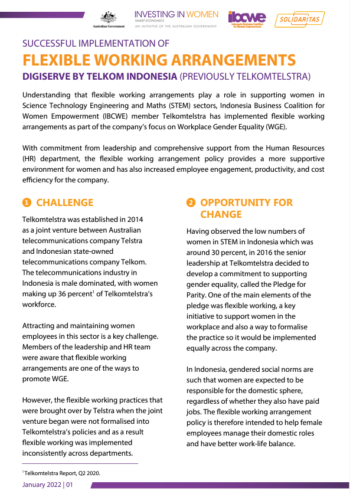Case Study: Flexible Working Arrangements at Digiserve by Telkom Indonesia (Previously Telkomtelstra)
Summary
Digiserve by Telkom Indonesia, previously known as Telkomtelstra, has effectively implemented flexible working arrangements to support gender equality in the workplace, particularly within the Science, Technology, Engineering, and Maths (STEM) sectors. Recognising the unique challenges faced by women in these fields, the company, a member of the Indonesia Business Coalition for Women Empowerment (IBCWE), introduced flexible working policies to provide a more supportive environment for women. The initiative, rooted in the company’s commitment to Workplace Gender Equality (WGE), was driven by leadership and strategically supported by the Human Resources (HR) department. Launched to address the low representation of women in STEM and the gendered expectations of domestic responsibilities, these policies have not only helped female employees manage their dual roles more effectively but have also boosted overall employee engagement, productivity, and cost efficiency.
Highlights
- Flexible working arrangements at Digiserve by Telkom Indonesia have significantly improved work-life balance and increased employee productivity.
- The company’s commitment to flexible working was part of a broader pledge to support gender equality, enhancing its appeal as an employer in the competitive STEM fields.
- The introduction of these policies led to more equitable work environments, positively impacting both female and male employees by fostering a more inclusive culture.
- By 2022, these initiatives had resulted in notable organizational benefits, including higher employee satisfaction rates and reduced operational costs due to decreased office space needs.
- Digiserve by Telkom Indonesia continues to innovate in its approach to flexible work arrangements, aligning with global trends towards more dynamic and adaptable working conditions.


